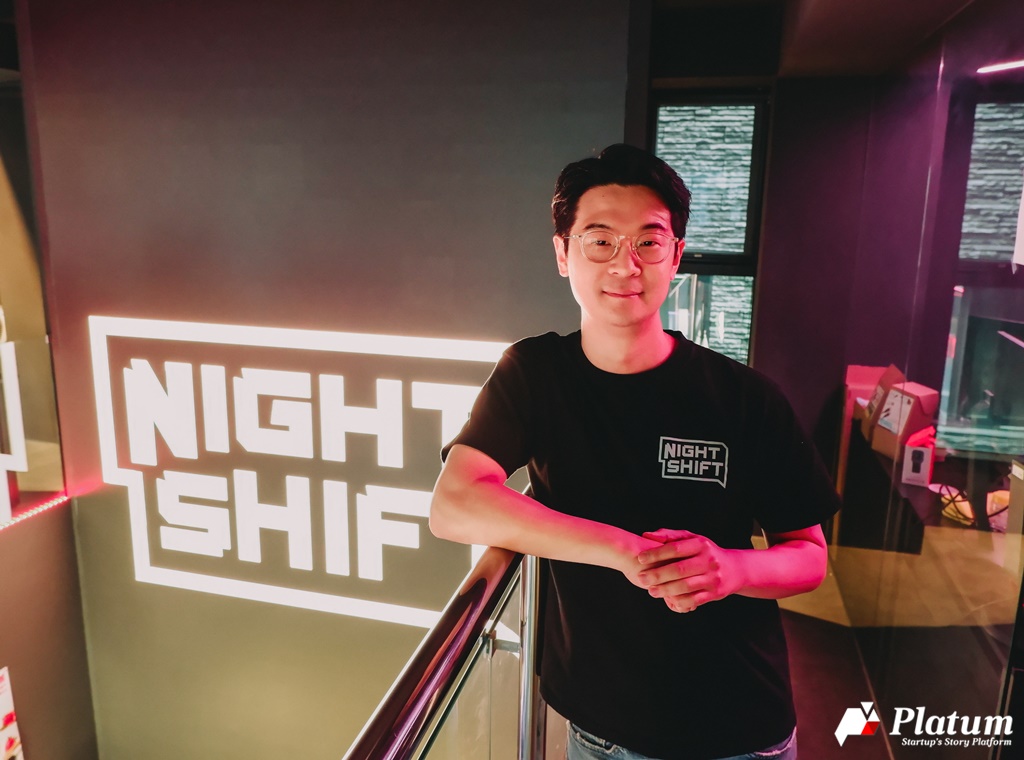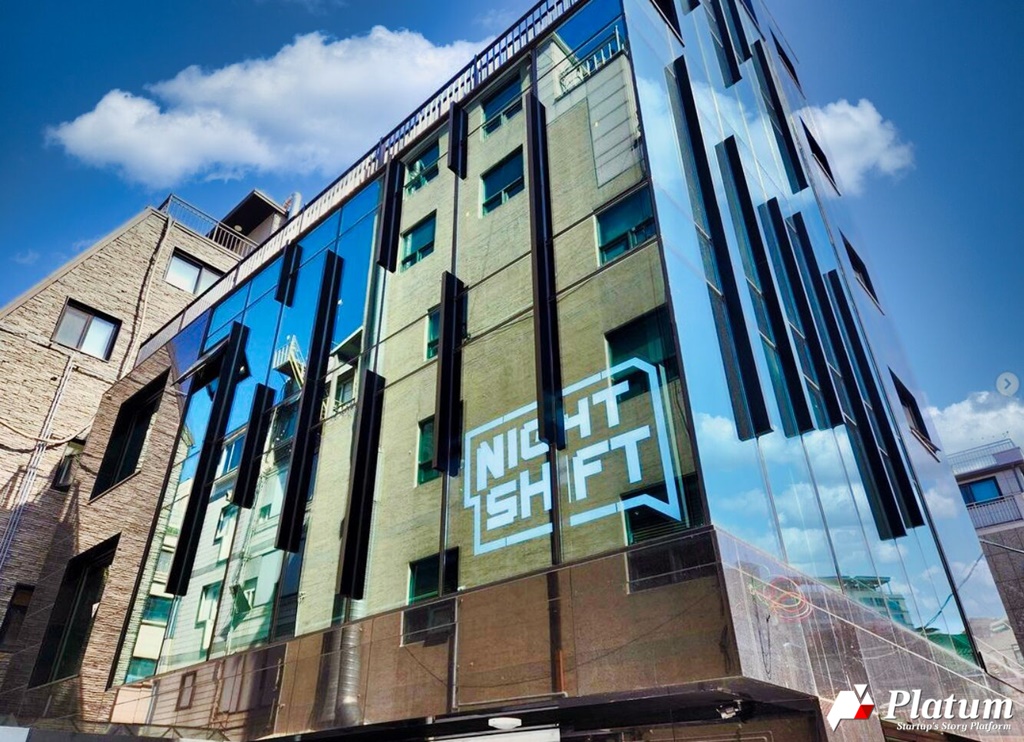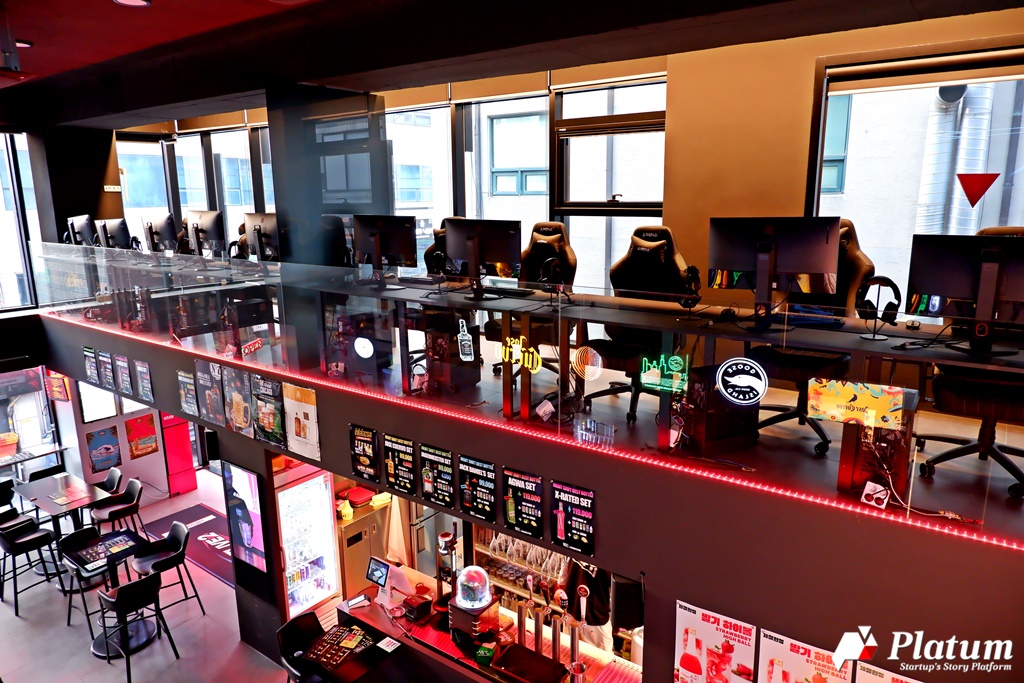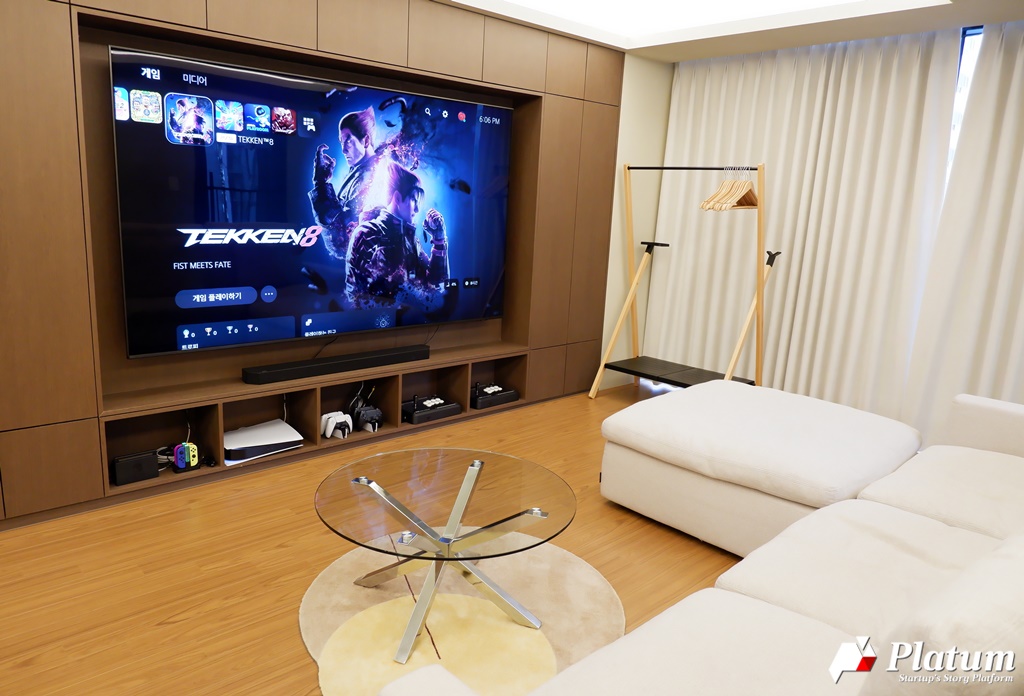
Joon-hyung Choi, CEO of NightShift ⓒPlatum
Esports was born in the late 1990s with the popularity of StarCraft and PC cafes, but initially failed to develop into an industry. Today, however, it has become a cultural sport, with its inclusion in the Asian Games and dedicated stadiums attracting significant attention. The sector is expected to grow to $31.2 billion by 2027.
Last November, the Gocheok Sky Dome was packed to capacity for the finals of the League of Legends World Championship (hereafter referred to as the LOLdcup), with over 18,000 fans attending the event.
CNN’s Marketplace Asia highlighted the excitement of the day. CNN anchor and correspondent Kristy Lou Stout joined thousands of fans in Seoul to watch the match between South Korea’s T1 and China’s Weibo Gaming, bringing the atmosphere to life. An interview with Naz Aletaha, Global Head of Esports for League of Legends, also explored how gaming has become a cultural centrepiece and competes with traditional sports.
At the same time, the NightShift Pub (Nash Pub), an esports pub in Bangi-dong, Jamsil, Seoul, was packed with fans watching the game on a big screen. The crowd was immersed in the game, shouting out the names of their favourite players. The pub crowd was characterised by a relatively older age group and the presence of food and drink compared to the stadium crowd.
NightShift(나이트쉬프트), the company that runs the Nash pub, point out that e-sports is not just for the younger generation, but also for those in their 30s and 40s. In fact, many of the people you’ll meet here are first-generation fans who have been around since the early days of esports.
Joon-hyung Choi, CEO of NightShift, spent more than a decade in advertising before embarking on a journey to find his own path. One day, a serendipitous opportunity came his way and he founded Korea’s first esports pub.

NightShift ⓒPlatum
-I used to work in advertising before I started my own business, but I quit because I was crazy about pizza.
I started in advertising, then moved into new media and space planning, and as I travelled more and more abroad, I had the opportunity to experience the cuisines of different countries. I was particularly interested in food, so I took great pleasure in exploring and tasting the local cuisine in each country I visited.
One day I tasted a pizza at a famous pizzeria near my workplace and was so impressed by the taste that I thought it was the “best pizza ever” and from that moment on I had a strong desire to make and sell my own pizza.
I already had a family and children, so starting a new life was never easy, but when I found out that the owner of the pizzeria was preparing to open a new branch in Gangneung, I didn’t want to miss the opportunity. I begged the owner and he agreed, so I left my 10-year career behind and went to Gangneung as a single man.
-You left your previous career behind and started in a new field, which must not have been easy.
I was new to the food industry, so I had to learn the basics from scratch. I started late and worked hard for two years, but I could see that my family in Seoul were getting tired of it. In the end, the first business I started with big ambitions to make the best pizza ever ended with me moving back to Seoul after not getting the results I wanted.
-Returning to advertising would have been the easiest option.
I left advertising to make a fresh start, so I felt it would be a real failure to go back there. I also decided that once I got into the food industry, I couldn’t leave.
My parents wanted me to help out at the Sundaeguk restaurant, a kind of Korean soup, that they were running at the time, and I think they were a bit frustrated that I was living for free without a job, so I decided to help out for a few weeks at first, but once I started making Sundaeguk in the kitchen, I realised that I could make my own way in the industry.
I realised that the basics of all kitchen tasks are similar, and sundaeguk is a very popular dish with the public. The competition in the market is fierce, but I saw great potential, so I told my mother that I would take on the role of chef, and I knew that as long as I could work on the details, the restaurant would be stable.
-What details did you try to iron out? Did it go smoothly?
No matter what field you’re in, nothing is easy and what may seem like a simple task actually requires a lot of hard work and dedication, and running a Sundaeguk restaurant was no exception.
When I decided to step into the kitchen for the first time, I had a picture of the perfect sundae in my head, and I knew that if I could recreate that special taste, I would be a huge success. I threw myself into making Sundaeguk, eating three meals a day, constantly tasting and tweaking the recipe. I struggled for about a year to get the flavour I wanted, and when I started getting positive feedback from customers, I knew I was on the right track.
-But it didn’t take long to startup Night Shift.
One day, Sung-ho Choi, the CEO of VEAT Law Firm, whom I’ve known since childhood, told me about a unique business idea he’d been dreaming about for a long time, combining food and beverages with games. He told me that this business model required expertise in both IT and food and beverage, and that it’s hard to find people with experience and background in both. However, as I had some experience in both areas, he asked me about the possibility.
After hearing Choi’s proposal, I gave it a lot of thought and consideration before making the decision. When the Sundaeguk business started to show signs of growth, I debated whether it was wise to go in a different direction. However, I was convinced that this field had the potential for great success right from the start, so I decided to move in this direction.
-How did your family react when you told them you were starting a new business?
My wife was probably the one who took it the hardest and it still breaks my heart to think of all the anxiety and difficulty she went through. Even though I haven’t achieved much yet, I think it’s all thanks to her that I’ve got this far.

Gaming fans enjoy games and drinks at Nash Pub. ⓒ NightShift
-The concept of the Nash Pub is an ‘adult playground’. Why did you choose this theme?
Although the idea of the Nash Pub was first proposed by Sung-ho Choi, CEO of VEAT, to convince myself of the feasibility of this business plan, I conducted market research to thoroughly validate the business model.
This is an unexplored field. While there is still a strong perception in South Korea that adults playing games is still considered childish, the country is now known as the home of e-sports, and the Internet cafe business owes much of its success to the country’s first generation of gamers. They started the StarCraft craze, developed the gaming culture, and now play an important role in all walks of life. Consumers from this background have a lot of purchasing power, but there are very few places in Korea where they can enjoy the gaming culture.
As someone in my 40s, I love to play games, but I don’t feel comfortable sitting next to high school students in an internet cafe. The lack of a dedicated space for adult gamers to enjoy their own hobby is a huge disappointment. In fact, the need for a space among adult gamers has been very vocal, so I expected the demand to be unexpectedly high. As there are no services or spaces that cater to this market, I thought there was a lot of potential for growth if I pioneered this space and established us as a centre for adult gaming culture.
-What differentiates NightShift from competitors or latecomers?
To run this business successfully, experience in both food and beverage (F&B) and information technology (IT) is essential. As well as being able to design a space like a gaming arena, you also need to be able to organise the kitchen efficiently and develop systems to use the large LED screens in different ways.
We currently have a system in place to broadcast live e-sports matches and we have a separate broadcast room that can also host YouTube broadcasts. We can show the YouTube feed and the game on one screen.
At the same time, a pub needs to have a quality food and drink service, and combining them into one is essential, but not easy. It’s a real challenge to maximise customer satisfaction with PCs (internet cafe) and alcohol in the same room.
-The building has several floors, each with a different concept: the second floor is a pub, the third floor is an arena and the fourth floor is a private room.
This building has an open floor plan with the second and third floors connected. The second floor is the Nash Pub (NIGHT SHIFT PUB) and the third floor is a stadium called the NIGHT SHIFT AREA. The fourth floor is a gaming party room called Nagit (NIGHT SHIFT AGIT).
We made the second and third floors look like one room, but in reality they are separate rooms for different business operations. If we hadn’t connected the two floors and put PCs in that space, we could have accommodated more customers. We gave up on that and designed it as a structure where you can enjoy games.
The biggest feature is the physical connection between the pub and the arena, so that people can play together in the same place. The concept is to combine an eSports arena and a pub in one space, so that people can play, eat, drink and watch games all in one place. The key point is that not only the players but also the spectators can watch the game while having a drink. The biggest benefit of the arena is that it gives amateur gamers the experience of playing in front of an audience.
Nagit is a space for adult gamers who want to play privately. You can play in a luxurious space with food and drink. There are five PCs, a 98-inch TV and various console games for teams to play in a room that looks like a hotel when there are no PCs.
-It is a combination of content (games) and space. When I think of that space, I think of sports pubs in the UK showing the EPL. What did you focus on when you started this business?
When I first set out to create this business, I looked to see if there was a market for it. I did my own research and was surprised to find that the number of people who attend NFL (National Football League) games is similar to the number of people who watch e-sports online around the world. Based on this insight, I realised that if I could provide a variety of spaces and content for esports fans to enjoy, I had a very good chance of success.

The Nash Pub and Night Shift Arena are connected by a duplex structure. ⓒPlatum
-It has been a year since you started the company. I think it’s often the case that things don’t go according to plan. What about you?
The first challenge was that there are a lot of gamers in Korea, but the main place they hang out is online. We had a naive expectation that if we just announced that we had created a special place for people who enjoy games, they would respond, but it’s not easy to change their habits.
To get adult gamers to come, we had to find a way to engage them. In the early days, we simply posted direct outreach to gaming-related communities and channels, which of course was met with criticism: ‘Don’t post ads.
However, an opportunity arose to turn things around. After witnessing the rapid sell-out of tickets for League of Legends (LOL) matches, we changed our PR strategy. The approach was to raise awareness of our services as an alternative for fans who couldn’t make it to the stadium, and it worked. In fact, this is the first time we’ve done this in the country, so we’re developing it gradually through trial and error.
When I think of e-sports today, League of Legends comes to mind. You hosted a viewing party for the League of Legends World Championship (LOLdcup) last year, what was the atmosphere like?
We worked with the Viewing Party team to stream the LOLdcup live and the players loved it. We had a great response, especially from adult fans who are passionate about the same games. They said it was a unique experience, a different kind of enjoyment that you don’t get in the stadium. They also mentioned that it was much more fun to watch the games with people who share a similar hobby without having to go to the stadium.
-You also organised a viewing party for Connect 2 in Tokyo last year, which is not a very popular game.
We were worried that it would be difficult to attract people because it’s such a small game, but in the end our fears were unfounded. We saw a lot of interest and enthusiasm from fans who came from all over the country. Despite the six-hour match, people stayed to play and enjoy the game. The response was another positive sign of the potential of our business.
– E-sports is not held every day, is it possible to integrate it into other areas? There are very few places in Korea that have such a large LED screen, 3 m wide by 5 me long, indoors.
The Nash Pub has the flexibility to be used for more than just gaming and can be used for whatever the customer wants. For example, we recently had a blues club hire our space and it was a great sight to see them dancing. We’re also open to the possibility of using it as a fan meeting place, so we’re looking forward to seeing more uses in the future. We are approaching all possibilities with an open mind and believe that the value of the space depends on how our customers use it.
On non-gaming days, we run the venue as a regular pub. The emphasis is on uncompromising quality of food and drink, which is why we have a professional draught beer qualification, regular equipment checks and a bartender with 15 years experience to ensure the quality of our alcohol is of the highest standard. We are developing a range of spirits and new menus to offer new experiences to our customers.

Night Shit Agit ⓒPlatum
-Despite the growth of the gaming industry, there is still a negative perception of e-sports.
I think this is due to the gap between the speed at which society develops and the speed at which public perception changes. Esports has already established its identity as a sport by being an official event of the Asian Games. South Korea is a powerhouse in esports, with high-profile players like Faker. We look forward to the day when it will be accepted as a natural part of everyday life to enjoy both esports and mainstream sports with the same interest. When that day comes, esports will become a fully integrated cultural phenomenon among the people. World taekwondo headquarters
-How do you want the public to perceive the Nash Pub as a space?
I want people to see it as a special place where they can experience their favourite games in a different way, not just as a place to play big games. Just as foreigners who love taekwondo visit Kukkiwon, the world headquarters of taekwondo, I dream of the day when overseas game fans visit the Nash Pub when they visit Korea. Even better, I can imagine Mr Faker himself visiting our shop and playing games.
-NightShift is creating an adult gaming culture. What are your future plans for the company?
Our short-term goal is to establish Nash pubs in the top five major cities in Korea. We’ve seen that many people who live in rural areas regret not being able to attend our viewing parties. If they can’t come, we have to go. We want to create a space where gamers from all over the country can enjoy gaming culture together.
We look forward to Night Shift taking the lead in adult gaming culture in Korea. Our ultimate goal is to become an icon of Korean e-sports by creatively connecting games and the real world.

ⓒPlatum
| 원문링크 | https://platum.kr/archives/228152 |
|---|